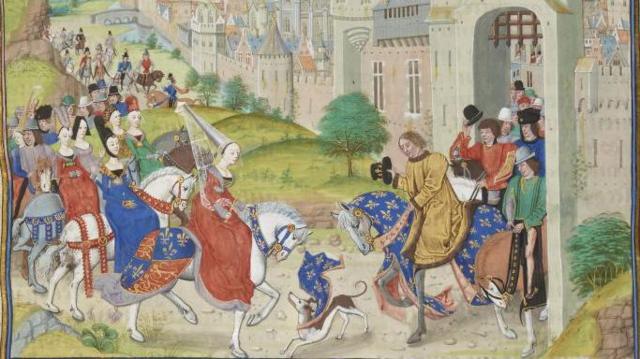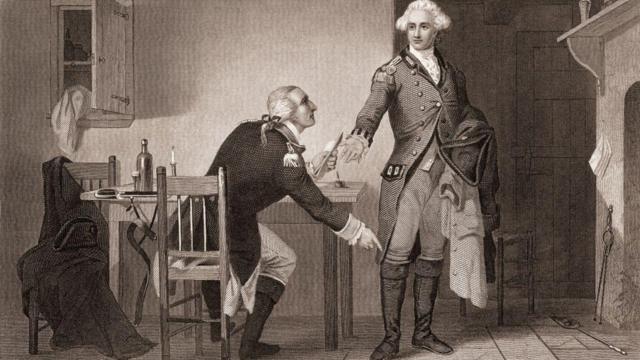Історія сповнена зрадників і вірних прихильників – а також людей, які були десь посередині.
Але іноді рішення окремих людей зрадити людину чи ідею можуть мати значний вплив на історію і навіть повністю змінити її хід.
BBC Bitesize наводить приклади таких зрад: одна допомогла скинути середньовічного короля, інша – убити популярного римського лідера, а третя ледь не посприяла поразці Сполучених Штатів у їхній війні проти британців.
Юлій Цезар: Остерігайтеся березневих ід!
Смертельна зрада Юлія Цезаря 15 березня 44 року до нашої ери змінила хід Римської історії. Завдяки Вільяму Шекспіру цей день назавжди асоціюватиметься з фразою “Остерігайтеся березневих ід” – попередженням бути обережними з оточуючими (березневі іди відносяться до 74-го дня римського календаря, 15 березня).
Юлій Цезар був військовим генералом і державним діячем, який піднявся до найвидатнішої посади в Римській республіці. Його влада була настільки великою, що на початку 44 року до нашої ери він зміг оголосити себе довічним диктатором.
Теоретично це означало, що він міг керувати країною одноосібно. Його політичні суперники побоювалися, що він стає занадто могутнім, і почали плести проти нього змови.
Трьома ватажками були Марк Юній Брут, Гай Кассій Лонгін і Децим Юній Брут – усі вони були сенаторами.
Децим Брут був близьким до Цезаря і вважався одним із його можливих спадкоємців. Тим часом Марк Брут раніше виступав проти Цезаря – він воював проти нього в битві при Фарсалі в 48 році до нашої ери. Однак після цього Цезар його помилував і підвищив.
Разом із приблизно 60 іншими змовниками вони оточили Цезаря у Сенаті Риму та вбили його.
Ми не знаємо, якими насправді були останні слова Цезаря, але Шекспір вирішив підкреслити глибину зради у своїй історичній п’єсі. У ній Юлій Цезар каже Марку Бруту “Et tu, Brutus?”, що означає “І ти, Бруте?” – підкреслюючи, що він не очікував, що його зрадить той, кого сам він пробачив і вважав своїм другом.
На жаль для змовників, вони не врахували, наскільки популярним був Цезар серед широкої публіки. Коли вони оголосили про його смерть з Капітолійського пагорба в Римі, реакція натовпу спочатку була приглушеною, а потім вилилася у гнів та насильство. Марк Брут, Децим Брут і Кассій були змушені тікати з міста.
Смерть Юлія Цезаря ознаменувала початок кінця Римської республіки, оскільки його призначений спадкоємець, Гай Юлій Цезар Октавіан Август, зрештою став першим імператором Риму.
Ізабелла Французька: бунтівна королева

АВТОР ФОТО,GETTY IMAGES Підпис до фото,Ізабелла Французька приїхала з візитом до свого брата Карла IV у Париж
Тоді як перші королеви за правом народження з’явилися у Британії лише у 16 столітті, свій слід в історії жінки-монархи залишали задовго до цього. Однією з них була Ізабелла Французька, яку іноді називають “Французькою вовчицею”, яка зіграла значну роль у падінні короля Англії Едуарда II у 1327 році.
Донька французького короля Філіпа IV Прекрасного, вона народилася на початку 1290-х років і вийшла заміж за Едуарда 25 січня 1308 року. Едуард був відомий тим, що мав фаворитів серед своїх дворян, спочатку Пірса Гевестона (його схопили і стратили у червні 1312 року ображені ним дворяни), а потім Г’ю Деспенсера Молодшого.
Коли Едуард оголосив війну брату Ізабелли Карлу IV Французькому в 1324 році, Деспенсер звинуватив її в тому, що вона була іноземною шпигункою, конфіскував її землі та обмежив її можливість бачитися з чоловіком. Однак Едуард все одно був готовий відправити її до Франції, щоб успішно домовитися про мир з її братом.
Самому Едуарду також необхідно було відвідати Францію, щоб віддати данину Карлу IV за його французькі земельні володіння. Однак він не бажав залишати Англію через загрозу повстання проти нього самого та Деспенсера.
Натомість він зробив помилку – відправив свого малолітнього сина та спадкоємця, майбутнього Едуарда III. Тож Ізабелла опинилася під захистом двору свого брата разом зі своїм сином. З цієї сильної позиції вона запропонувала королю ультиматум: Ізабелла та молодий Едуард повернуться лише в тому випадку, якщо Деспенсера усунуть з двору, а їй відновлять її статус і землі. Однак Едуард не захотів відмовився від Деспенсера.
Ізабелла об’єдналася з Роджером Мортімером, англійським дворянином у вигнанні, який утік з Лондонського Тауера після того, як його ув’язнили за участь у повстанні проти короля та Деспенсера. Разом вони планували вторгнутися до Англії та повалити цей дует.
З грошима, солдатами та припасами, які їм надав граф Ено (сучасна Бельгія), вони висадилися в Англії 24 вересня 1326 року. Підтримка короля Едуарда швидко зійшла на нівець, а до Ізабелли приєдналися його могутні зведені брати та двоюрідний брат. Г’ю Деспенсера схоплили і стратили, а Едуард був змушений зректися престолу на користь свого 14-річного сина. Пізніше того ж року його таємничим чином убили в замку Берклі.
За збігом обставин, правління Едуарда III почалося в 19-ту річницю весілля його ворогуючих батьків, 25 січня 1327 року.
Бенедикт Арнольд: горезвісний зрадник Америки

АВТОР ФОТО,GETTY IMAGES Підпис до фото,Офіцер американської армії Бенедикт Арнольд передає документи британському офіцеру Джону Андре під час війни за незалежність США
У США ім’я Бенедикта Арнольда є синонімом зради. Колись він був одним із найталановитіших фельдмаршалів Джорджа Вашингтона, і допоміг Континентальній армії здобути свою першу перемогу в американській війні за незалежність у форті Тікондерога в травні 1775 р.
Він досяг подальшого успіху в битві під Саратогою 1777 року, яка стала поворотним пунктом у війні та спонукала французів до союзу з революціонерами. Але все змінилося через кілька років, коли Арнольд зрадив американців і почав шпигувати на користь англійців.
Арнольд вважав, що його досягнення недостатньо винагороджували, що інші отримували визнання за його тактику, а він не отримав заслуженого підвищення. Через значні витрати його дружини у нього почали зростати борги, а Вашингтон дорікнув йому звинуваченням у неправомірній поведінці. Ображений, озлоблений і без грошей, Арнольд пішов на угоду з англійцями.
Коли Вашингтон запропонував йому посаду командувача армією в 1780 році, Арнольд натомість наполягав на необхідності контролювати оборону у Вест-Пойнті, штат Нью-Йорк, уздовж річки Гудзон. Це було місце стратегічного значення для зв’язку та транспорту до Нової Англії. Він планував послабити оборону та передати територію британцям в обмін на 20 000 фунтів стерлінгів, з можливим додатковим бонусом – заманити Вашингтон до ворога.
Зраду Арнольда виявили, коли людину у британській розвідці, з якою він спілкувався, схопили і знайшли в неї викривальні документи. Йому вдалося втекти на британський військовий корабель HMS Vulture, де він отримав звання бригадного генерала і почав воювати проти своїх колишніх товаришів.
Арнольд пережив війну, переїхав до Англії і помер там у 1801 році.


